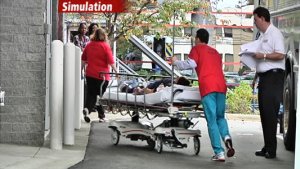Hospital emergency preparedness plans are an integral aspect of primary level care and disaster management in times of catastrophes, calamities as well as terrorist attacks wherein such event could lead to mass casualties and could bring about societal instability.
Health care facilities, especially in developed countries around the world have their specific accrediting bodies and/or organizations that would assess emergency contingencies and preparedness when faced with extreme cases of disaster and mass casualties. Generally, hospital emergency preparedness plans are overseen by a particular federal liaison who would assess emergency preparedness plans of a health care facility. In the case of North America, it is the Joint Commission on Accreditation of Healthcare Organizations or the JCAHO that evaluates health care facilities in North America in terms of emergency preparedness and contingencies in disaster management and hospital emergency preparedness plans.
Who are responsible in creating hospital emergency preparedness plans?
Before the basic emergency operation plan can be developed, the planning committee of a health care facility will first evaluate the characteristics of the targeted community to identify the most likely types of natural and man-made disasters that might occur in their respective community. The conceptual and evaluative process is the main responsibility of the local health care facility and its safety committee, safety officers or its emergency department manager. Basically, these people and group of individuals will be tasked in studying and evaluating the constant changes in the variables of a community at risk of natural and manmade disasters.
How are hospital emergency preparedness plans conceptualized?
Delegated individuals who are tasked in the study and preparation of hospital emergency preparedness plans would normally research and gather relevant data from various government units such as the local enforcement, fire departments and other independent emergency medical systems. Upon the sufficiency of data gathered from these local agencies such as local train and automobile traffic, flood prone areas, presence of fault lines and local weather, committees or persons in charge of the assessment can now map out an appropriate and realistic disaster management plan. Moreover, many of the considerations are also given to the possibility of mass casualties that could arise because of a community’s close proximity to chemical plants, nuclear facilities and military bases.
Understanding the importance of effective hospital emergency preparedness plans

